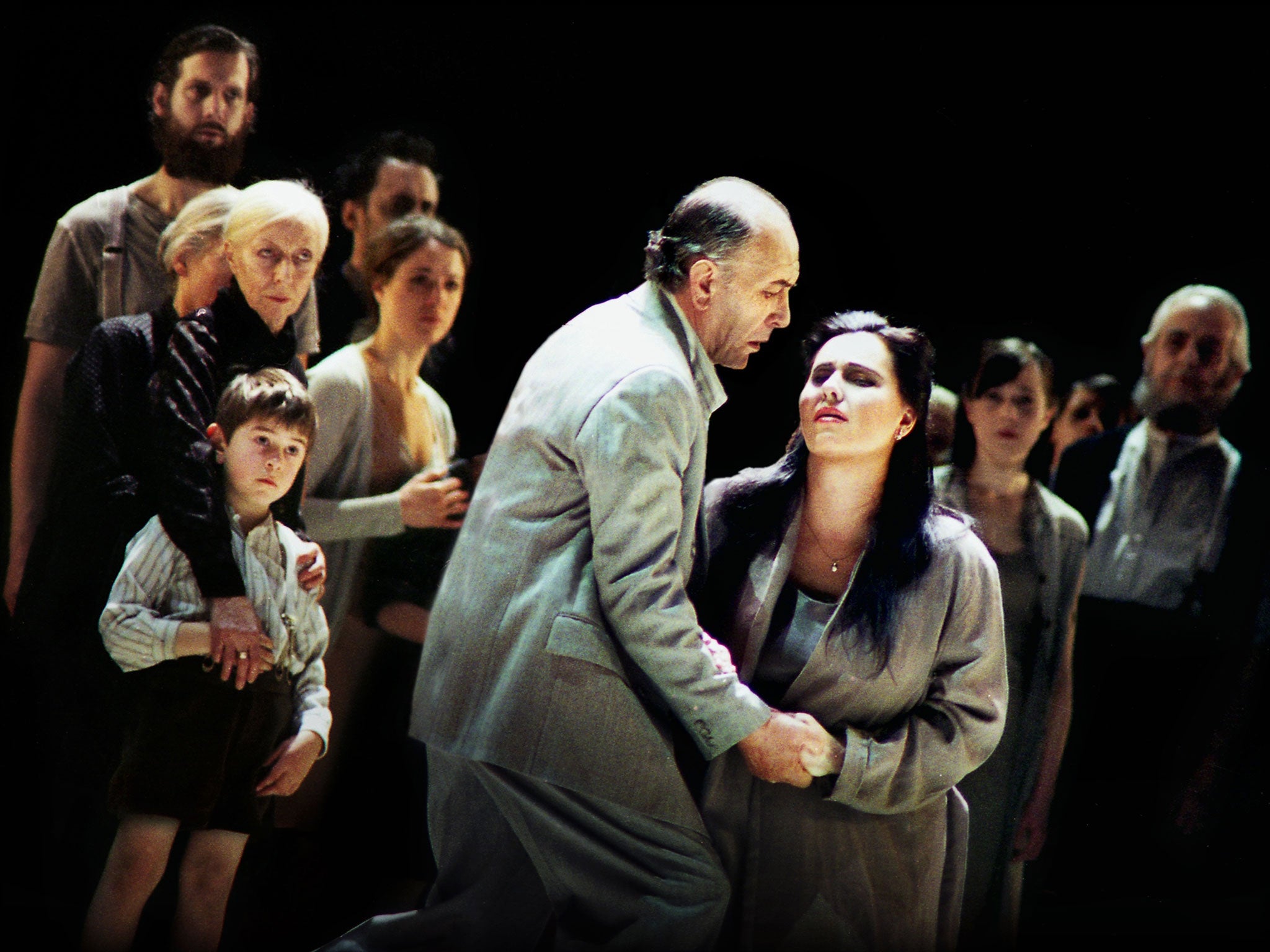Classical review: Nabucco - Fifty shades of grey, the opera
In a leaden park-and-bark reading of a Verdian tale of love and loss, the set has more dramatic range than the principals

First seen in Milan, Daniele Abbado's production of Nabucco is a penitentially grey experience. Redemption is slow to arrive in Verdi's Old Testament opera of captivity and oppression, the closest he got to writing an oratorio. The usual tropes of paternal and romantic love are sidelined in a drama of faith and power: heavy abstract nouns for two warring peoples to wrestle with, abuse or relinquish. The story follows the plight of the Jews as they are assaulted, conquered, and exiled from their homeland by the Babylonian King Nabucco (Nebuchadnezzar). Though the God that prevails is that of the Jews, the Babylonian deity Baal doesn't go down without a fight.
Abbado's production opens with a perfect synthesis of stage and pit as conductor Nicola Luisotti navigates the slow, stern beauty of Verdi's overture. As it proceeds, Alessandro Carletti's lighting bathes Alison Chitty's austere set of grey plinths in the pale wash of dawn, the glare of noon, the softening of dusk and the long shadows of a moonlit night. This perfection is shortlived. Despite the presence of an associate director and a movement director, Chitty's plinths display a wider dramatic range than the principals, channelling the Berlin Holocaust Memorial, tombs on the Mount of Olives, the tight alleys of the Lodz ghetto and the gas chambers. What dynamism there is on stage during the remainder of the opera comes from the furtive movements on the video screen – a series of pogroms surveyed as though from above – and from the watchful engagement of the non-singing actors and chorus.
Clad alike in 1940s greys, it's hard to tell a difference between Babylonian and Jew – a worthy point, perhaps, but not one that helps you follow the plot. While Abbado organises the chorus into Spielbergian huddles, the soloists get on with their jobs as usual. It's not as though there aren't histrionics. Leo Nucci's Nabucco loses his mind, Liudmyla Monastyrska's Abigaille loses her cool, and others their liberty. Occasionally there are random outbreaks of eye-contact.
Seldom is there a sense of relationships tightening, of blood-lines or curdled love. For the most part it is park and bark (Carè, Kowaljow and veteran High Priest Robert Lloyd), park and hiss (Nucci), park and melt (Pizzolato) and, in Abigaille's monstrous cavatina and cabaletta, park and deafen (Monastyrska). Orchestrally, the performance is superb, and the a capella chord at the close of the chorus "Va pensiero" is divine. Wonderful conducting from Luisotti but, plinths aside, it's a concert performance in Lenten clothing.
Gary Hill, the celebrated American video artist, has never directed an opera before. As he cheerfully announced ahead of the opening of his Lyon Opera and Edinburgh International Festival co-production of Fidelio (Opéra de Lyon, Lyon ***) last week, he didn't even know what Fidelio was. His first idea, to transpose Beethoven's score so that Bob Dylan could sing the role of Florestan as US-army whistleblower Bradley Manning, was rejected. A second idea, to frame the opera in a spaceship and interpolate cantos from Harry Martinson's 1956 science-fiction verse-novel, Aniara, was not. Thus Fidelio opens in a remote galaxy, which looks almost exactly as people have imagined remote galaxies to look since the 1920s, save for the breathtaking darting and spiralling of Hill's three-dimensional projections and the total isolation in which Nikolai Schukoff's Florestan is suspended.
The conducting is impeccably judged. In an opera that lurches from the domestic to the universal, Kazushi Ono has identified tempi and textures that build to cumulative effect. Much of the singing is sincere, expressive, almost naïve in its beauty, particularly that of the male chorus and the two sopranos, Michaela Kaune (Leonore) and Karen Vourc'h (Marzelline). Sadly, one has to listen past the dental-surgery whirr of the Segways on which the singers ride about. (Segways? In the 24th century?) I predict pursed lips in Edinburgh. Not because of the Segways, the spaceship or the costumes that make everyone look like two-legged polyhedra. But because Fidelio isn't just about ideals of freedom and clemency. It's also about a gaoler's daughter whose little heart is broken.
On the previous night in Lyon, Thierry Escaich's taut first opera, Claude (Opéra de Lyon, Lyon ****), premiered to a storm of anti-gay-marriage protest outside the house (the current justice minister was in the audience) and rapturous applause within. Former justice minister Robert Badinter's libretto is a furious portrait of brutality and homophobia in the French penal system. Conducted by Jérémie Rhorer, Olivier Py's brilliantly choreographed production reiterated the violence and monotony of prison life, the deprivations, sexual frustrations and humiliations, and, in the three-tiered cells of Pierre-André Weitz's set, the desperate attempts of the prisoners to maintain their individuality. Claude (baritone Jean-Sébastien Bou) is a married man imprisoned for theft who falls in love, almost against his will, with Albin (counter-tenor Rodrigo Ferreira), and is sent to the guillotine. Constructed almost as a Passion, with extensive use of chorus and allusions to the soundworlds of Messiaen, Berg and Shostakovich, Claude is a bold, intelligent, concise work that deserves an international audience.
'Nabucco' (020-7304 4000) to 26 Apr; 'Fidelio'/'Claude' (opera-lyon.com) to Sat, and at the Edinburgh Festival in August
Critic's Choice
Paul Lewis plays the Brahms First Piano Concerto with Kirill Karabits and the Bournemouth Symphony Orchestra in a programme that includes Schubert's Rosamunde Overture and Beethoven's Symphony No 8, at Lighthouse, Poole (Wed), Great Hall, Exeter (Thu), Town Hall, Cheltenham (Fri). Composer Michel van der Aa directs the world premiere of his multimedia opera Sunken Garden at London's Barbican, from Fri.
Subscribe to Independent Premium to bookmark this article
Want to bookmark your favourite articles and stories to read or reference later? Start your Independent Premium subscription today.

Join our commenting forum
Join thought-provoking conversations, follow other Independent readers and see their replies